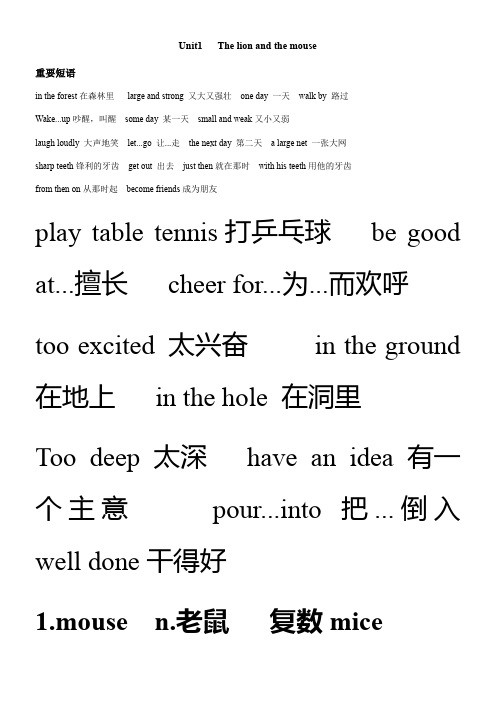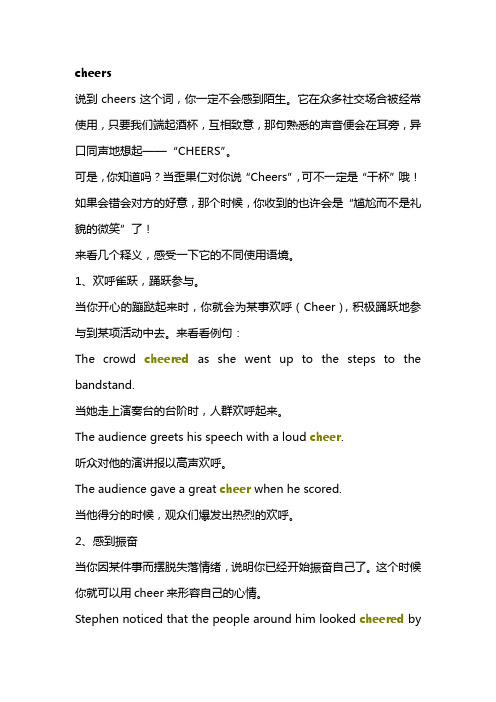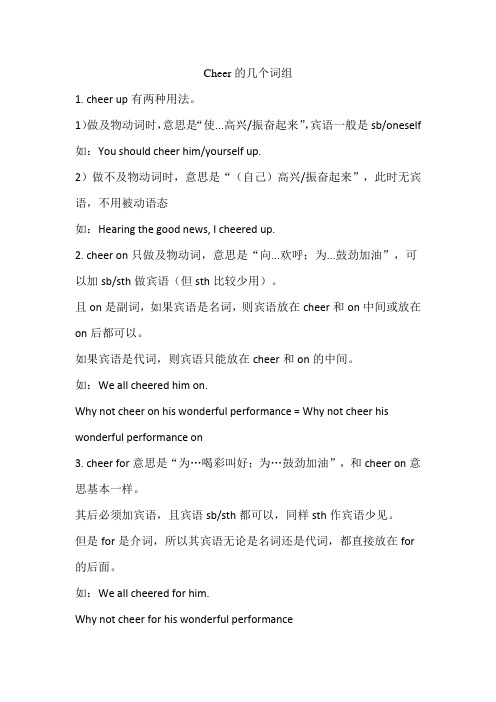cheer的过去式和用法例句
6B-Unit1---The-lion-and-the-mouse知识点讲解及练习

Unit1 The lion and the mouse重要短语in the forest在森林里large and strong 又大又强壮one day 一天walk by 路过Wake...up吵醒,叫醒some day 某一天small and weak又小又弱laugh loudly 大声地笑let...go 让...走the next day 第二天 a large net 一张大网sharp teeth锋利的牙齿get out 出去just then就在那时with his teeth用他的牙齿from then on从那时起become friends成为朋友play table tennis打乒乓球be good at...擅长cheer for...为...而欢呼too excited 太兴奋in the ground 在地上in the hole 在洞里Too deep 太深have an idea 有一个主意pour...into把...倒入well done干得好1.mouse n.老鼠复数mice【解析】mouse意为“老鼠”,其复数为mice;意为“鼠标”时,其复数为mouses。
【例句】A mouse is always afraid of acat.老鼠总是怕猫。
【例题】()There are some little in the hole.A.mouseB.miceC.mousesrge adj大的反义词small 近义词big大的;巨大的【解析】large常指面积、范围等,可表示数和量(当它直接用于人时,可表示身体大);big常指程度、规模、重量等,亦可指人,比较口语化。
【例句】(1)China is a large and beautiful country.中国是个幅员辽阔又美丽的国家。
(2)He is a big man.他是个大人物。
【例题】连词成句。
cheers的几种用法

cheers说到cheers这个词,你一定不会感到陌生。
它在众多社交场合被经常使用,只要我们端起酒杯,互相致意,那句熟悉的声音便会在耳旁,异口同声地想起——“CHEERS”。
可是,你知道吗?当歪果仁对你说“Cheers”,可不一定是“干杯”哦!如果会错会对方的好意,那个时候,你收到的也许会是“尴尬而不是礼貌的微笑”了!来看几个释义,感受一下它的不同使用语境。
1、欢呼雀跃,踊跃参与。
当你开心的蹦跶起来时,你就会为某事欢呼(Cheer),积极踊跃地参与到某项活动中去。
来看看例句:The crowd cheered as she went up to the steps to the bandstand.当她走上演奏台的台阶时,人群欢呼起来。
The audience greets his speech with a loud cheer.听众对他的演讲报以高声欢呼。
The audience gave a great cheer when he scored.当他得分的时候,观众们爆发出热烈的欢呼。
2、感到振奋当你因某件事而摆脱失落情绪,说明你已经开始振奋自己了。
这个时候你就可以用cheer来形容自己的心情。
Stephen noticed that the people around him looked cheered byhis presence.斯蒂芬注意到周围的人因为他的到场而振奋起来。
Cheer up! I'm sure you'll feel better tomorrow.振作起来!我肯定你明天会好些的。
Our teachers often cheer us up in class every day.老师常常使我们每天在课堂上都很振奋。
看过了以上两个释义及其使用语境,我们再来看看cheers在英美语中用法的不同。
英式英语中的Cheers在英式英语中,cheers有三种释义:干杯、谢谢、再见。
8年级上册英语单词表仁爱版

8年级上册英语单词表仁爱版仁爱版八年级上册英语单词表:Unit 1 Topic 1.1. almost [ˈɔːlməʊst] 副词,几乎,差不多。
2. against [əˈɡenst] 介词,对着,反对。
3. term [tɜːm] 名词,学期;术语;条款。
4. cheer [tʃɪə(r)] 动词,加油;欢呼;喝彩;名词,欢呼声,喝彩声。
5. cheer...on 为……加油。
6. team [tiːm] 名词,队,组。
7. win [wɪn] 动词,获胜,赢得(过去式won [wʌn])8. sport [spɔːt] 名词,体育运动。
9. prefer [prɪˈfɜː(r)] 动词,更喜欢,宁愿(过去式preferred)10. cycle [ˈsaɪkl] 动词,骑自行车;名词,循环;自行车。
11. row [rəʊ] 动词,划船;名词,(一)排,(一)行。
12. quite [kwaɪt] 副词,相当,很,十分。
13. bit [bɪt] 名词,一点,一些,少量。
14. a bit (of) 有一点。
15. join [dʒɔɪn] 动词,加入,参加;连接;会合。
16. club [klʌb] 名词,俱乐部;纸牌中的梅花。
17. skate [skeɪt] 动词,滑冰,溜冰。
18. volleyball [ˈvɒlibɔːl] 名词,排球。
19. tennis [ˈtenɪs] 名词,网球。
20. table tennis 乒乓球。
21. player [ˈpleɪə(r)] 名词,运动员;比赛者,选手。
Unit 1 Topic 2.1. ill [ɪl] 形容词,有病的;不健康的。
2. fall ill 患病,病倒。
3. mind [maɪnd] 动词,介意;关心;名词,思想,想法。
4. practice /ˈpræktɪs/(美)或/ˈpræk.tɪs/(英)名词,练习;实践;动词,练习;实践(过去式practiced)5. somewhere [ˈsʌmweə(r)] 副词,在某处。
cheer的几个词组cheer(uponfor)

Cheer的几个词组
1. cheer up有两种用法。
1)做及物动词时,意思是“使...高兴/振奋起来”,宾语一般是sb/oneself 如:You should cheer him/yourself up.
2)做不及物动词时,意思是“(自己)高兴/振奋起来”,此时无宾语,不用被动语态
如:Hearing the good news, I cheered up.
2. cheer on只做及物动词,意思是“向...欢呼;为...鼓劲加油”,可以加sb/sth做宾语(但sth比较少用)。
且on是副词,如果宾语是名词,则宾语放在cheer和on中间或放在on后都可以。
如果宾语是代词,则宾语只能放在cheer和on的中间。
如:We all cheered him on.
Why not cheer on his wonderful performance = Why not cheer his wonderful performance on
3. cheer for意思是“为…喝彩叫好;为…鼓劲加油”,和cheer on意思基本一样。
其后必须加宾语,且宾语sb/sth都可以,同样sth作宾语少见。
但是for是介词,所以其宾语无论是名词还是代词,都直接放在for 的后面。
如:We all cheered for him.
Why not cheer for his wonderful performance。
外研版英语七下第三模块《Makingplans》重要知识点总结

外研版英语七下第三模块《Makingplans》重要知识点总结第三模块:M3: Making plansM3U1:1.go ove r(adv.)“复习(功课等)”;“仔细审查/检查某物(试卷等)”。
是“动词+副词”型的短语,名词作宾语时,放在over前后均可;代词作宾语时,必须放在go与over之间。
如go it/them over 复习一下它/它们。
与go有关的其它短语:go by(时间)流逝 go on 继续;进行 go off离开(尤指为了做某事);(闹铃)发出响声 go away走开go ahead先走;(口语)请吧;说吧 go wrong出毛病go out外出;熄灭 go to bed去睡觉go to school/church/work去上学/去做礼拜/去上班go back 返回 go back to (doing sth.)重新开始,又接着做2.plan(动词) to do sth计划/打算做某事=make a plan(名词)/plans(名词) to do sthplan(名词) for(doing)sth. “(做)......的计划”eg.The plan for the picnic is very good.野餐的计划很棒。
They are talking about their plan for buying a new house.他们正在谈论买新房的计划。
3.on/at the weekend=on/at weekends在周末4.see/watch a movie(美式英语常用)/film(英式英语常用)=go to the movies/ the cinema看电影5.have a picnic=go for a picnic举行野餐have a ...(学科)class/lesson/上一节......课have a good/nice/fantastic time 玩得开心;过得愉快have a look看一看 have a rest休息一会儿have a (class) meeting开(班)会have breakfast/lunch/supper/dinner吃早/中/晚饭6.help with the housework=help (to) do housework帮忙做家务7.on March 16/Saturday morning/a cold winter evening 在三月十六号/周六上午/在一个寒冷的冬天的晚上,表示具体到几月几号;周几的上、下午或者晚上;某个特定条件的日子,用介词on。
cheer的用法和固定搭配

cheer的用法和固定搭配英文回答:Usage of "Cheer""Cheer" is a transitive verb that means to encourage or support someone, typically with enthusiasm and excitement. It can also be used as a noun to refer to a shout or expression of encouragement.Here are some common uses of "cheer":To cheer someone on: To express encouragement or support for someone, especially in a competition ordifficult situation.Example: The crowd cheered on the runners as they crossed the finish line.To cheer up someone: To make someone feel happier ormore cheerful.Example: She cheered me up by telling me funny stories.To cheer: To express joy or enthusiasm.Example: The children cheered when they saw the presents.Fixed Phrases with "Cheer"There are several fixed phrases that use the word "cheer":Cheer up: To become happier or more cheerful.Example: Cheer up, it's not the end of the world.Cheers: An expression used to express gratitude or to celebrate a success.Example: Cheers to the bride and groom!For a cheer: To give someone encouragement or support. Example: For a cheer, let's all raise our glasses.Cheer someone on: To express encouragement or support for someone, especially in a competition or difficult situation.Example: The crowd cheered on the runners as they crossed the finish line.Out of cheers: To be no longer able to express encouragement or support.Example: I'm out of cheers, I've been talking for too long.中文回答:“欢呼”的用法和固定搭配。
cheer的短语搭配

cheer的短语搭配
当谈到"cheer"这个词时,它可以有多种短语搭配。
首先,我们可以说"cheer up",这意味着让某人振作起来或者感到更加快乐。
另外,我们还有"cheer on",这表示为某人加油或者鼓励某人。
此外,还有"cheer for",这意味着为某人或某支持者喝彩或者为某事物的成功而欢呼。
同时,我们还可以说"cheer someone/something on",这表示为某人或某事物喝彩或者鼓励。
最后,我们还有"three cheers for",这是一种用来表示赞美或者庆祝的口号。
这些都是"cheer"这个词常见的短语搭配。
希望这些例子能够帮到你。
cheer 的用法和例句

cheer 的用法和例句"Cheer" 是一个多功能的词,可以作为动词、名词,也有形容词形式。
以下是"cheer" 的一些用法和例句:●作为动词(动作):1.激励、欢呼:The crowd cheered loudly when their team scored a goal.(当他们的队进球时,人群欢呼雀跃。
)She cheered her friend on during the marathon.(在马拉松比赛中,她为她的朋友加油鼓劲。
)2.使高兴、振奋:A good laugh can cheer you up.(开怀大笑能让你振作起来。
)Her kind words cheered him after a difficult day.(在一天的困境之后,她的亲切话语让他感到振奋。
)3.庆祝、欢庆:They gathered to cheer the success of the project.(他们聚在一起庆祝这个项目的成功。
)●作为名词:1.欢呼声、喝彩声:The stadium was filled with cheers as the team won the championship.(球队赢得冠军时,体育场充满了欢呼声。
)The audience erupted in cheers when the performer took the stage.(演员登台时,观众爆发出一片欢呼声。
)2.助威团、欢呼队:The cheerleaders led the crowd in cheers for the team.(啦啦队带领着观众为球队欢呼。
)●作为形容词:1.令人振奋的、愉快的:We had a cheerful gathering to celebrate the holidays.(我们欢快地聚在一起庆祝节日。
)She has a cheerful disposition.(她性格开朗。
- 1、下载文档前请自行甄别文档内容的完整性,平台不提供额外的编辑、内容补充、找答案等附加服务。
- 2、"仅部分预览"的文档,不可在线预览部分如存在完整性等问题,可反馈申请退款(可完整预览的文档不适用该条件!)。
- 3、如文档侵犯您的权益,请联系客服反馈,我们会尽快为您处理(人工客服工作时间:9:00-18:30)。
cheer的过去式和用法例句
cheer做动词有欢呼;使振奋等意思,那么你知道cheer的过去式是什么吗?下面小编为大家带来的cheer的过去式和用法例句,接下来一起来学习一下吧。
cheer的过去式和其他时态:
过去式: cheered
过去分词: cheered
现在分词: cheering
cheer的用法:
cheer的用法1:cheer的基本意思是大声欢呼,指有组织、有目的地喊出一些套话(如加油等),主要用于比赛时为参赛者鼓劲,也可用于对演出成功或重大节目的欢呼与庆祝。
cheer的用法2:cheer引申可表示鼓励鼓舞,指重新恢复其思想、精神、勇气或体力; 和in连用时则可表示以喝彩、赞扬或帮助等手段去激起更大的勇气,直至最后的努力。
cheer的用法3:cheer可用作不及物动词,也可用作及物动词。
用作及物动词时,接名词或代词作宾语,偶尔也可接以形容词充当补足语的复合宾语。
cheer的用法4:cheer可用于被动结构,常用by引起的短语表示动作的主体。
cheer的过去式例句:
1. Swiss fans cheered Jakob Hlasek during yesterdays match with Courier.
昨天,瑞士球迷在雅各布赫拉塞克对阵库里耶的比赛中为赫拉塞克喝彩加油。
2. Then I remembered the cheque, which cheered me up.
然后我想起了那张支票,这让我精神大振。
3. The assembled multitude cheered and whistled as the political leaders arrived.
当政治领袖到达的时候,聚集的人群欢呼起来,并吹起了口哨。
4. As soon as the tremor passed, many people spontaneously arose and cheered.
震感刚一过去,很多人就自发地站起来欢呼。
5. Stephen noticed that the people around him looked cheered by his presence.
斯蒂芬注意到,周围的人们似乎因为他的到来而受到鼓舞。
6. She was cheered and clapped by tourists who jostled to see her.
那些拥挤着想见她一面的游客们朝她欢呼鼓掌。
7. The delegates cheered and rose to their feet.
代表们欢呼着站起身来。
8. He cheered up on Christmas Day itself.
他圣诞节那天振作起来了。
9. The students on the grass bank cheered noisily.
学生们在河岸的草滩上吵闹地欢呼着。
10. The audience cheered and clapped.
观众又是喝彩又是鼓掌。
11. Everyone cheered and clapped.
人人都鼓掌欢呼。
12. He cheered up at the thought of seeing her again.
一想起又可见到她,他便兴奋起来.
13. All the crowd cheered and threw their hats up in the air.
整个人群都欢呼起来,把帽子抛向空中.
14. She cheered up after we had been to see her.
我们去看她后,她感到很高兴.
15. Everyone cheered for the violinist at our school concert.
在学校音乐会上,大家都为小提琴手喝彩叫好.。
